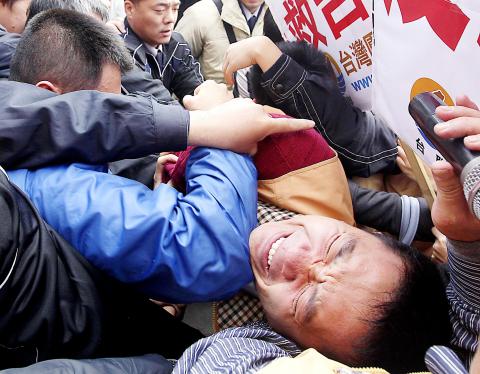After a week-long trip around Taiwan dogged by persistent protests, China’s Association for Relations Across the Taiwan Straits (ARATS) Chairman Chen Deming (陳德銘) returned to Taipei yesterday to attend the annual Cross-Strait CEO Summit — only to be greeted by more demonstrations.
Although the summit purports to facilitate business relationships across the Taiwan Strait, critics say the meeting in effect allows the Chinese Nationalist Party (KMT) and Chinese Communist Party (CCP) to formulate decisions on cross-strait trade policies while circumventing legislative and administrative procedures.
Three separate rallies — led by the Taiwan Solidarity Union (TSU), pro-independence groups and youth activist organizations — took place outside the summit’s venue in Taipei’s Xinyi District (信義), while more than 800 business and political heavyweights from both sides of the Taiwan Strait gathered inside.

Photo: Reuters
Among the attendees at the two-day event are former vice president Vincent Siew (蕭萬長) and former Chinese vice premier Zeng Peiyan (曾培炎), who both spoke at the summit’s opening ceremony.
Business leaders participating in the summit include Jack Ma (馬雲), founder of the Chinese e-commerce giant Alibaba; Sinopec Group senior vice president Dai Houliang (戴厚良); Taiwan Semiconductor Manufacturing Co chairman Morris Chang (張忠謀); and Acer Corp founder Stan Shih (施振榮).
Scuffles with police occurred as protesters from a rally organized by the Taiwan Solidarity Union attempted to inch closer to the venue, resulting in TSU Department of Organization Deputy Director Chang Chao-lin (張兆林) being taken away by police for questioning.
Protesters from a rally led by pro-independence groups congregated across the street, waving towering flags that measured up to three stories high, emblazoned with pro-independence slogans.
A prerecorded track that chanted: “The communist livestock have arrived; the Chinese communist robbers have arrived,” blasted repeatedly through loudspeakers aimed toward the venue.
Economic Democracy Union convener Lai Chung-chiang (賴中強) led a third rally, shouting slogans that denounced participants in the summit as members of the “cross-strait privileged stratum.”
Lai was joined by members of several youth organizations that blossomed following the Sunflower movement in late March and April, in which students and activists occupied the Legislative Yuan’s main chamber for 23 days to protest the government’s handling of a proposed cross-strait service trade agreement.
With important officials from the KMT and the CCP present, Lai said the summit can be seen as an example of the party-to-party negotiation mechanism established during the KMT-CCP forum in 2005, adding that such an arrangement bypasses legal procedures required by Taiwanese law.
The summit touches on many issues that are still under legislative deliberation, Lai said, including draft bills for the proposed free economic pilot zones, as well as cross-strait cooperation in medical and biotechnological industries.
“By conducting negotiations with Chinese authorities without the approval of the Mainland Affairs Council, participants in the summit have broken the law,” Lai said. “Vincent Siew and [former Straits Exchange Foundation chairman] Chiang Pin-kun (江丙坤) should take responsibility for their criminal behavior.”
The protesters offered organizers of the summit a prop of a “moonflower,” referring to Chen’s remarks last week that cautioned against the occurrence of a “Moonflower” movement — a hypothetical sequel to the Sunflower movement — to ensure that the cross-strait trade agreement passes soon.

Taiwan is stepping up plans to create self-sufficient supply chains for combat drones and increase foreign orders from the US to counter China’s numerical superiority, a defense official said on Saturday. Commenting on condition of anonymity, the official said the nation’s armed forces are in agreement with US Admiral Samuel Paparo’s assessment that Taiwan’s military must be prepared to turn the nation’s waters into a “hellscape” for the Chinese People’s Liberation Army (PLA). Paparo, the commander of the US Indo-Pacific Command, reiterated the concept during a Congressional hearing in Washington on Wednesday. He first coined the term in a security conference last

Prosecutors today declined to say who was questioned regarding alleged forgery on petitions to recall Democratic Progressive Party (DPP) legislators, after Chinese-language media earlier reported that members of the Chinese Nationalist Party (KMT) Youth League were brought in for questioning. The Ministry of Justice Investigation Bureau confirmed that two people had been questioned, but did not disclose any further information about the ongoing investigation. KMT Youth League members Lee Hsiao-liang (李孝亮) and Liu Szu-yin (劉思吟) — who are leading the effort to recall DPP caucus chief executive Rosalia Wu (吳思瑤) and Legislator Wu Pei-yi (吳沛憶) — both posted on Facebook saying: “I

The Ministry of Economic Affairs has fined Taobao NT$1.2 million (US$36,912) for advertisements that exceed its approved business scope, requiring the Chinese e-commerce platform to make corrections in the first half of this year or its license may be revoked. Lawmakers have called for stricter enforcement of Chinese e-commerce platforms and measures to prevent China from laundering its goods through Taiwan in response to US President Donald Trump’s heavy tariffs on China. The Legislative Yuan’s Finance Committee met today to discuss policies to prevent China from dumping goods in Taiwan, inviting government agencies to report. Democratic Progressive Party Legislator Kuo Kuo-wen (郭國文) said

The Ministry of Economic Affairs has fined Taobao NT$1.2 million (US$36,900) for advertisements that exceeded its approved business scope and ordered the Chinese e-commerce platform to make corrections in the first half of this year or its license would be revoked. Lawmakers have called for stricter supervision of Chinese e-commerce platforms and more stringent measures to prevent China from laundering its goods through Taiwan as US President Donald Trump’s administration cracks down on origin laundering. The legislature’s Finance Committee yesterday met to discuss policies to prevent China from dumping goods in Taiwan, inviting government agencies to report on the matter. Democratic Progressive Party